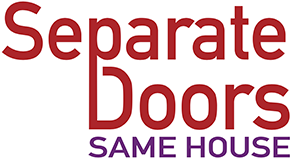A Happy New Year and a hopeful new decade
Separate Doors aims to encourage the representation of the lives of people with learning disabilities in theatre for general audiences.
Last year the Separate Doors project worked with the Royal Shakespeare Company, The Royal Academy of Dramatic Art, six theatre companies, twenty theatre makers and actors, six playwrights and fifteen vocational actors with learning disabilities.
We explored the Silent Approach, a non verbal rehearsal method, in master classes.
We hosted a forum at RADA for fifty industry influencers and published the Separate Doors 3 report, distributed in print format to producing theatres in the UK.
The Separate Doors 3 report will be available soon in digital format via http://www.separate doors.org as will audio recordings of interviews and panel debates.
Our aim for next year is to encourage the training, casting and engagement of more actors and people with learning disabilities in our theatre and our performance culture.
We’re looking for new partners, do be in touch if you’d like to be involved.
Here are some quotes from the report.
The issue today is with disabled artists themselves blocking out non-disabled performers. You’ve got to get people working together, people with all different kinds of diversities. All different backgrounds, viewpoints, races and abilities and disabilities working together.
Nicky Priest, actor and stand up comedian with Asperger’s Syndrome
I hope more and more directors, working across the country in different companies, at different scales, feel confident to cast an actor with learning disabilities.
Hannah Miller, Head of Casting, Royal Shakespeare company
The kind of expertise Separate Doors offers needs to be rolled out and be made more accessible to people making integrated work.
Ben Weatherill, writer (Jellyfish, Bush Theatre and National Theatre)
I thought the Silent Approach master class and method was truly democratic and taking away language really interesting because I’m always questioning how you can make high quality theatre with actors with learning disabilities.
Nathalie Carrington, Artistic Director, This New Ground.
The Silent Approach has given me a lot to think about in my own practice.
Nickie Miles-Wildin, Director.

The Silent Approach is a dynamic method, it may have been non verbal but it certainly wasn’t silent, it was speaking very profoundly.
Amanda Whittington, Playwright.
Separate Doors shines a light on the many different ways of working within our very niche sector and its so important to keep learning disability on the agenda in the way that it does. Its also so good to challenge people, especially around language, in the way that the Silent Approach does.
Nick Llewellyn, Artistic Director, Access All Areas.
Its important to feel connected to the sector. Separate Doors helps to bolster that and to ground that and so it’s really useful.
Ben Pettitt-Wade, Artistic Director, Hijinx.
I think all of us felt deeply moved and changed by the Silent Approach.
Geoff Bullen, Director Emeritus of acting at the Royal Academy of Dramatic Art.
The Silent Approach works because all of the actors, with and without learning disabilities, have equality – because its our way of working, without words.
Rebekah Hill, actor with Downs Syndrome, Dark Horse


